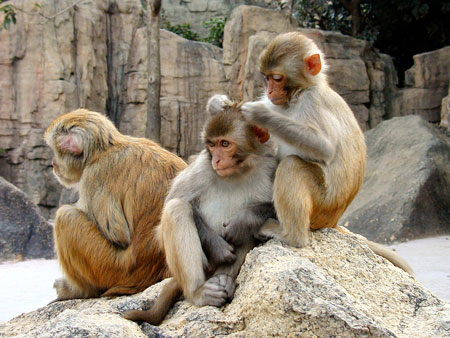Monkeys have genes against diseases of the century
A gene in the monkey's body helps their bodies produce many vaccines against the immunodeficiency virus (SIV) in monkeys. This finding could help scientists study vaccines against AIDS in humans.
SIV has a close relationship with human immunodeficiency virus (HIV). AIDS caused by HIV is called "century disease". Many scientists believe that humans infected with SIV from primates in the early 20th century. But there is also another theory that both humans and primates are infected with SIV from a third source.
AFP reported that Harvard University scientists in the United States vaccinated a herd of rhesus monkeys and left them exposed to SIV several times in two weeks. Half of the monkeys are infected with the virus, but half are not infected. When examining uninfected animals, the team found that they all possessed a dominant gene called TRIM5.

Rhesus monkeys. Photo: mostinterestingfacts.com.
Professor Norman Letvin, who led the study, said the finding could help scientists develop a better AIDS vaccine for humans.
" Our research shows that it is very likely that humans have the same anti-AIDS genes as TRIM5, but their traits only manifest in some people. In other people, they are recessive. So we not only study the ability to make AIDS vaccines more effectively, but also think about mapping the genes of people whose anti-AIDS genes express their traits , "Letvin said.
An anti- AIDS vaccine has been tested in Thailand, but it only reduced the risk of infection by 31.2%. According to Letvin, the sad thing is that the anti-AIDS effect of this vaccine decreases after three years.
[#RelatedNews (173) #]
- Monkeys drink a lot of alcohol because of genes
- Monkeys near the Fukushima plant may be contaminated
- The mysterious monkey eating bamboo in Africa
- Monkeys are more susceptible to disease when near people
- Finding the gene that causes serious disease
- African gorillas: 98% of genes are like human genes
- Video: The way to flirt with a strange capuchin monkey
- Neanderthal's persistent revenge
- Monkey can identify himself in the mirror
- Strange things about monkeys
- Monkeys have the most funny faces
- Sponges have up to 70% of human genes
 Green tea cleans teeth better than mouthwash?
Green tea cleans teeth better than mouthwash? Death kiss: This is why you should not let anyone kiss your baby's lips
Death kiss: This is why you should not let anyone kiss your baby's lips What is salmonellosis?
What is salmonellosis? Caution should be exercised when using aloe vera through eating and drinking
Caution should be exercised when using aloe vera through eating and drinking